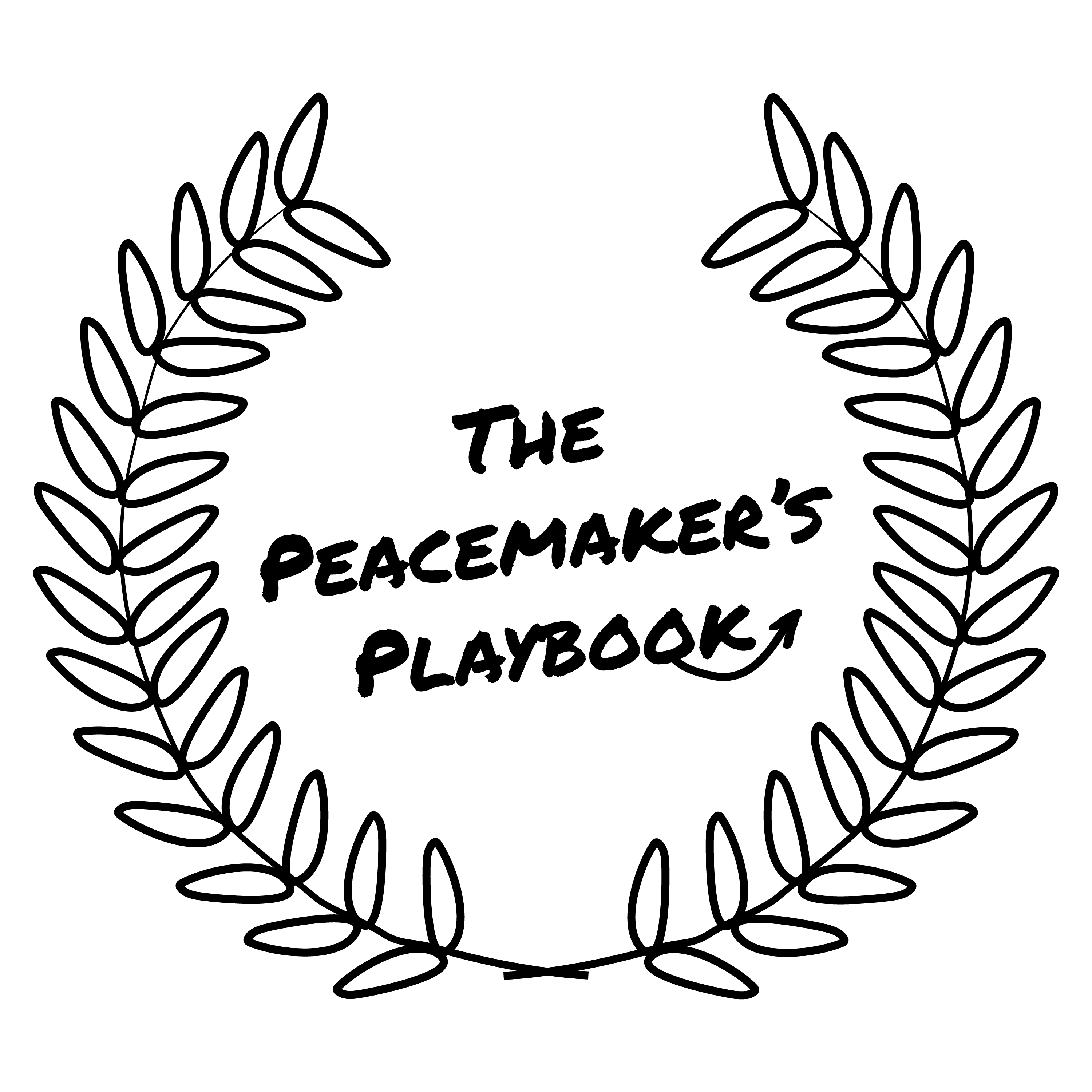Transcript lightly edited for clarity.
Josh: Hi! I’m Josh.
Kaleene: And I’m Kaleene.
Josh: We’re a married couple. Together, we’re learning how to be kind in divided times and sharing the best tactics we come across with you here, at The (RE-BOOTED) Peacemaker’s Playbook.
In a description of the older version of this show, which was really just a few - ahem - rough episodes in 2020, we said that, with this podcast, we want to help prevent a second American Civil War. While that early description wasn’t and isn’t a lie (we Americans are indeed dangerously divided, and the toxicity seems like it’s getting worse), it may have given the impression that we’re pessimistic.
We’re not. We’re optimistic.
Today we’re going to share what we’re learning about being optimistic and about trusting that our future is bright, especially if we stand together…and we’re going to do it in seven minutes or less.
Let’s go!
Kaleene: [audio clip of toddler saying "read, read"] That’s our two-year-old daughter telling us she wants us to read to her. We’ve been reading many stories to her…over and over and over again. The Little Engine That Could is currently in heavy rotation. You’re probably familiar with some version of it, but just so you’re…tracking…with us, here is a summary, which I’ll read directly from Wikipedia:
In the tale, a long train must be pulled over a high mountain after its locomotive breaks down. Larger locomotives…are asked to pull the train; for various reasons they refuse. The request is sent to a small engine, who agrees to try. The engine succeeds in pulling the train over the mountain while repeating the motto: "I-think-I-can".
This simple story of willpower and optimism has been an inspiration to kids young and old for generations.
Josh: Optimism is expecting the best outcome, even when things could go the other way. Optimism is the opposite of pessimism, which is expecting the worst outcome, even when things could still turn out well. Many of us tend to be pessimistic about a lot, including our political and cultural division in America. When Kaleene and I read articles or talk with our connections and the topic of division in America comes up, nearly everyone seems to be resigned to the continued fraying of our society. While some say or write such reckless, rabble-rousing words that it makes us wonder if they actually want violence, most folks’ pessimism is more subtle, revealing itself in fear or numbness. Either way, hardly anyone says they think we’re going to be okay. The vibe seems to be that more and more political conflict is our fate. Well, it’s not. Instead, we want to be more like The Little Engine: optimistic, trusting that our future in America is bright, especially if we stand together.
Optimists can and should still be realists, though, and as peacemakers we must acknowledge that, in our hatred for one another, America is in a bad way. But as long as we’re being realistic, we should also recognize that optimism is the way.
Why is optimism, realistically, the only choice for those who want to make peace happen?
Kaleene: In Barking Up the Wrong Tree, Eric Barker says, “In your head, you say between three hundred and a thousand words every minute to yourself. Those words can be positive (I can do it) or negative (Oh god, I can’t take this anymore). It turns out that when these words are positive, they have a huge effect on your mental toughness, your ability to keep going. Subsequent studies of military personnel back this up. When the Navy started teaching [applicants to the Navy SEAL program] to speak to themselves positively, combined with other mental tools…passing rates increased nearly ten percent.” The ‘positive self-talk’ those future Navy SEALs used is a form of optimism, and as Eric Barker pointed out, research shows that optimism - and the grit it produces - can be the thing that makes success happen. If the research is correct, then Wikipedia was wrong: The little train engine didn’t just succeed while repeating “I-think-I-can”; it succeeded by repeating those now famous words. Optimism is the only choice for those who want to make peace happen, because it’s effective.
But that’s not all.
Nicholas Christakis - I pray I'm saying his name correctly - is a sociologist and physician. His research has shown that “…many emotions can pulse through social networks,” kind of like infectious diseases. (Hello, COVID.) Choose to be optimistic, and you’ll make it easier for people around you to be optimistic too, compounding optimism’s effectiveness. Optimism is contagious. (And a lot better than COVID.)
So optimism is the only choice for those who want to make peace happen, because it’s effective and because it’s contagious. Optimism works!
Is that it, though? Is optimism - looking on the bright side - ultimately just a hack that makes us more likely to meet our goals here and now?
Martin Luther King Jr. famously said that “the arc of the moral universe is long, but it bends toward justice.” We don’t know much, if anything, about the way events in the world will be worked out, but if Dr. King was right, then anything is possible, even in the short term. And by swimming with the current of the cosmos, those of us who are optimistic will be seen to have been the most realistic all along.
The future really is bright.
Josh: Let’s talk takeaways. For me, this is about empowerment. Optimism is powerful - it’s effective and it’s contagious. But so is pessimism! Many of us default to pessimism (and there’s a way in which pessimism feels good), but whether we realize it or not, our pessimism affects the world. If like the majority of Americans, you’re exhausted by division, expecting the best outcome is your best chance to see more unity and is your only choice. And you have control over your expectations, which is very empowering.
Kaleene: Yes, I agree.
Josh: Americans face many external threats, but by far the biggest risk is our own internal dysfunction. If we stand together, united in our ideals, we’ll pull through, which will be good for us (obviously) and good for humans around the world. ‘Standing together’ doesn’t mean agreeing with each other on everything - many of the issues we tussle over internally are matters of life and death, after all. No, ‘standing together’ means that, at the end of the day, we still view each other as neighbors and treat each other as neighbors, which is exactly what this show is about.
So join us next time for The Peacemaker’s Playbook!
Wikipedia contributors. “The Little Engine That Could.” Wikipedia, 10 Oct. 2022, en.wikipedia.org/wiki/The_Little_Engine_That_Could.
“Definition of Optimism.” www.dictionary.com, www.dictionary.com/browse/optimism. Accessed 28 Oct. 2022.
Orth, Taylor. “Two in Five Americans Say a Civil War Is at Least Somewhat Likely in the Next Decade.” YouGov, 26 Aug. 2022, today.yougov.com/topics/politics/articles-reports/2022/08/26/two-in-five-americans-civil-war-somewhat-likely.
Barker, Eric. Barking up the Wrong Tree: The Surprising Science Behind Why Everything You Know About Success Is (Mostly) Wrong. HarperCollins, 2017.
“How to Be an Optimist, When You Always See the Negative.” NBC News, 24 Aug. 2017, www.nbcnews.com/better/health/how-train-your-brain-be-more-optimistic-ncna795231.
“Who Is Quoted?” Oxford Reference, www.oxfordreference.com/page/who-is-quoted.
“Arthur Brooks on Why We Hate Our Political Enemies -- and How to Stop.” YouTube, www.youtube.com/watch?v=NO0gesJOqQ4.
Ackerman, Elliot, and Admiral James Stavridis. “World War III?” https://www.thefp.com/, 17 Nov. 2022, www.thefp.com/p/world-war-iii.




Member discussion: